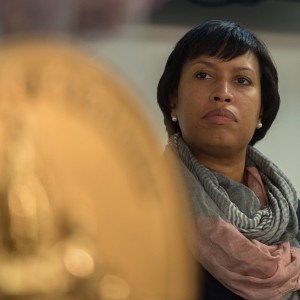Gray won, as did the Whites. Then Orange lost, along with others on the “Green Team.” And it all made the D.C. Democratic primary more colorful than expected.
The national lede out of Tuesday’s election was obvious: presumptive presidential nominee Hillary Clinton won a landslide victory over Bernie Sanders, 77 to 22, in their last contest before next month’s Democratic National Convention in Philadelphia. The two candidates huddled for nearly two hours at a Capitol Hill hotel, and released almost identical statements pledging to unify against presumptive Republican nominee Donald Trump in the general election.
Yet the most consequential developments Tuesday were in the District of Columbia’s local politics. In an unambiguous defeat for Democratic Mayor Muriel Bowser, three of her D.C. Council allies lost, and former Mayor Vincent Gray — whom Bowser ousted in 2014 — won a primary to return to the city legislature. Gray beat incumbent Yvette Alexander, Robert White bested incumbent Vincent Orange and Trayon White defeated incumbent LaRuby May. It was a big blow against Bowser’s political operation, known as the “Green Team,” which prompted Gray spokesman Chuck Thies to tweet, “It’s not easy being green.”
For her part, the mayor is putting on a good face. She tweeted congratulations to the primary winners, saying she looked forward to “working with you all to continue moving DC forward,” and congratulated Robert White in person. (One bright spot for Bowser among the competitive contests was the Council race in her home ward, where her protege Brandon Todd held onto his Council seat.)
The mayor herself won’t face voters again until 2018, but Tuesday intensified speculation that she’ll face a tough challenge, including a potential re-match with Gray. After all, she defeated him amid a highly publicized campaign finance scandal regarding his 2010 race, but the former mayor ultimately was not charged in the federal investigation. His supporters are casting Tuesday’s victory as “Vince-dication,” to borrow a Thies term.
So, eh, definitely wouldn't want to be Muriel Bowser in the next DC mayoral primary.
— Matt McDermott (@mattmfm) June 15, 2016
Tonight adds huge fuel for candidates mulling @murielbowser challenge in 2018.
— Will Sommer (@willsommer) June 15, 2016
One big question is whether voter rejection of Bowser’s allies actually signals disapproval of the mayor herself. David Alpert, founder of the influential local blog Greater Greater Washington, doesn’t buy it. Center for American Progress president Neera Tanden also sounds skeptical. Still, the consensus is that the mayor will now face more questions over her agenda.
Tuesday’s election was again marked by low turnout, a trend in D.C. primaries. The Board of Elections reported 98,667 votes cast in a city with 461,575 registered voters. Last week, Bowser told InsideSources she wants the primary moved up on the calendar, perhaps to be held on the same day as elections in neighboring Maryland and Virginia.
District Republicans were also upset by this year’s primary date. It meant they had to hold their presidential vote in March “due to Republican National Committee rules that prevent parties from selecting Delegates within 45 days of a national convention,” according to a press release.
On the subject of dismal turnout, D.C. GOP executive director Patrick Mara said in a statement that he had his entire polling place to himself on Tuesday. “However, at least I had the opportunity to vote,” he said. “District voters with no party affiliation – America’s most disenfranchised voters – are excluded from voting at all in primaries. In municipal elections, District officials should consider a nonpartisan system of voting that allows all to vote regardless of their political affiliation.”

